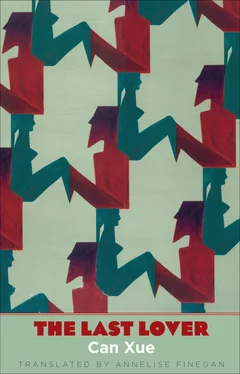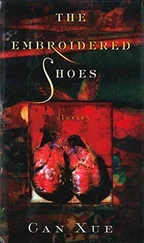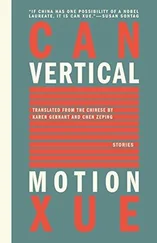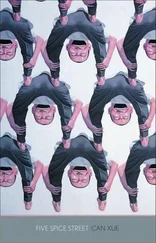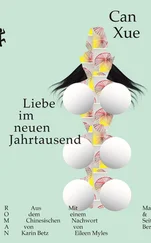Zhenya’s speech had just ended when Daniel again saw Amei. She went out quietly through the main gate. Daniel shouted to her. She did not answer.
“Life is so fine! Red dragonflies, girls!” Zhenya said.
That day the two of them returned to the shop arm in arm. On the road, Daniel smelled the icy wind blowing from Siberia, bitterly cold, but fresh and new.
Standing in the southern wind that blew across the wilderness, Maria felt her mood brighten and expand. She had taken a late-night train. She’d slept in the car while the train rocked, and had many uncommonly strange dreams. When she awoke these were wholly forgotten. All she recalled was a dream about snakes. In her dream, nimble, delicate green snakes pushed into her room through every crack and crevice. Afterward, the sound of strangers’ voices entered the room, and the snakes floated one by one into the air and disappeared. She didn’t wake when the train reached the station. A train attendant woke her. The attendant was a young girl, with a freckled snub nose. She looked as though she might be Cambodian. She stood to one side and watched Maria collect her bags, as if there were something she wanted to say, but she held herself back from speaking. When Maria disembarked the girl also helped carry her luggage, warning her in a professional voice, “It’s very chilly outside, take care not to catch a cold.” Maria thought the girl was a bit unusual.
The place was called North Island. It was a place Maria had dreamt of as a child. Toward the end of his life her grandfather had told her about this place in a few spare words. Over the years that followed a notion often occurred to Maria: could North Island be her true hometown? At present she felt that her coming here wasn’t a sudden whim she’d seized on, but rather that she’d arrived after several decades of premeditation. It was a secret journey. She hadn’t even told Daniel.
There were buildings hidden among the bamboo groves. The village covered a considerable stretch of ground. Maria had never seen bamboo this large and tall before. Its height exceeded that of poplar trees, and the smooth trunks left one with a feeling of dread. The village was made up of earthen houses with grass-thatched roofs, scattered thinly over a large area.
The taxi driver brought her to the entrance of the village and departed. Maria looked toward a wilderness extending as far as the eye could see, and her heart brimmed with uncertainty: What did these villagers do for their livelihood?
Based on arrangements she’d made beforehand, she was met as a guest. A large, tall woman with a voice like a man’s took her suitcase and led her through the bamboo groves. The woman was barefoot. She wore a dark blue linen gown, with her heavy bronze hair drawn up behind her head. Maria thought that the woman, whose name was Wula, was probably about forty years old. She also thought that Wula’s whole body seemed flush with strength, like an animal’s. The woman walked too fast for her and kept having to stop and wait. Maria felt apologetic.
They stopped at the door of one of the earthen houses. This building was a little larger than the others, but already old, having a look of decline about it. Even its wooden doors swayed. Just inside was a spacious central room with a number of giant ceramic water vats arranged around it. In the center of the building were an enormous square table and wooden chairs that were also large and rough but looked very comfortable. Maria thought that perhaps all the people here were incredibly tall and large. After she sat down in one of the chairs, Wula disappeared. Maria heard the water in the vats splashing, ding dong , against the sides as if they contained some kind of aquatic animal. Maria looked into the bedroom and saw that the bedding was done in very aggressive colors, a homespun cloth with a background dyed deep blue with a pattern of large gold flowers. In the dimness it gave off an ambiguous light. “How beautiful!” Maria was inwardly surprised, then her heart surged with a sort of regret, a pained feeling at the imperfect art of her own handmade weavings.
Someone knocked on the door. Maria stepped over, opened it, and saw a man with a body like a pylon and hair that was already white. He asked whether Wula was in. Maria said she had just left.
“That poor woman!” the man said, stooping and lifting the covers from the water vats to look inside.
The room was too dark for Maria to make out the animals in the water vats, but she saw indistinctly that there was something in every one. The vats were deep. The things attempted to climb out, but never succeeded.
“What are these animals?” Maria couldn’t help asking.
“They’re peculiar to this place. They used to be feral, but then, over many years, they became domesticated. At first they ran into the village in packs, jumped into our jars, and sat there without moving. Then, later on, we domesticated them. We named them golden tortoises, even though their bodies don’t have shells. Wula raised all the ones here in this room. Before this, we planted rice paddies for our livelihood. After the tortoises came, no one planted any more. When you arrived you saw, too, how all the land lies uncultivated. They are really tortoises of desire! What’s the old saying? ‘Where there is desire, there is a wilderness,’ is that right?”
When he spoke, his white teeth flashing, Maria grew alarmed. She sensed that he was a man inclined to violence. But she also thought his sort of violence was harmless.
“Why would the tortoises seek their own death?” Maria sank into confusion.
“Maybe they want a life of certainty. Every vat is a dungeon.”
“What do they eat?”
“For a long time now they haven’t eaten anything. They depend on nourishment from our bodies to live. Just think, who wouldn’t want to run a business that required no investment? You only have to change the water once a day! And a tortoise sells for 200 yuan. As each day lengthens, the people of the village become like the tortoises. You didn’t meet anyone on the road coming in, did you? It’s because they were all lying down inside their houses. Except for small children, most people are lying down.”
“Why are they lying down when they could go outside and play?”
“Who would be in the mood for play? They contemplate their life of suffering instead.”
“Wula, too?”
“Wula is an exception. That’s why I called her ‘poor woman.’ She has no time for contemplation. She’s opened this hotel and she has to take in travelers from outside. My name is Qing. Didn’t I tell you that already?”
After Qing had inspected the tortoises, he stood at the entrance smoking tobacco. Now Maria could see Qing’s face. His expression was hard to describe because the left and right sides of his face could have belonged to two completely different persons. Maria was sitting directly opposite him, so she saw the left and right sides of his face at the same time. The left side was lively, and at the moment it wore a bitter expression, even though a second before it had looked full of energy and even slightly evil. The right side of his face had a somewhat frightening look, dead like a corpse or vampire, with a firmly shut mouth and an eye like a glass bead. Perhaps he knew that the right side of his face was frightening because he was apt to place his left side forward. Now he turned his face sideways. Maria saw his left eye blinking continuously. The muscles in his left cheek twitched.
Maria stood and walked to the doorway to see where he was looking, and discovered Wula already within his view. Maria was surprised: what a strong influence Wula had on him! Even the left side of his body began to twitch. It was an unbearably painful sight. When Wula walked in, her brow creased, Maria was even more surprised to see that her appearance had completely changed. She no longer looked forty years old, brimming with a natural wildness. She looked instead like a weathered old woman. Her long face, like old tree bark, made Maria wonder whether this was the same woman as before.
Читать дальше
